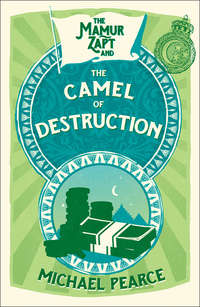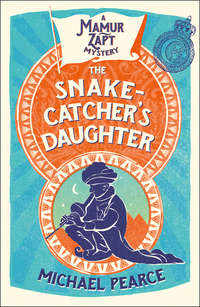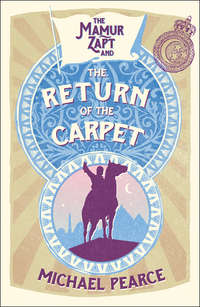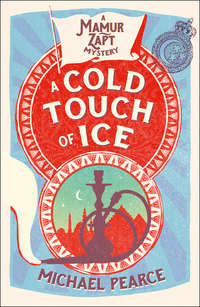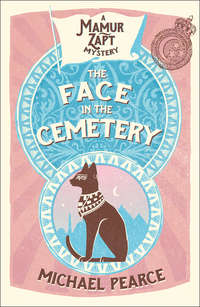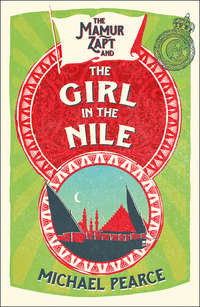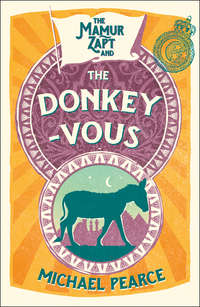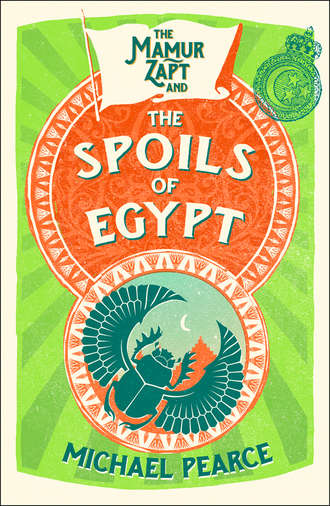
Полная версия
The Mamur Zapt and the Spoils of Egypt
And by the time you got anywhere, thought Owen, half the city would have burned to the ground.
‘Is there no other exit?’
The Fire Chief pushed back his tarboosh and scratched his head.
‘Well—’ he was just beginning, when on the other side of the square there was a fierce squeal of brakes and a tram-bell started jangling furiously. An arabeah veered suddenly and there were agitated shouts.
A crowd seemed to be gathering in front of one of the trams. It looked as if there had been an accident.
A policeman somewhere was blowing his whistle. Owen could see him now pushing his way through the crowd. The crowd, unusually, parted and Owen caught a glimpse of a still form lying beside the tram.
It seemed to be a woman, a European.
He got to his feet. The Fire Chief, used to dealing with accidents, fell in beside him. Together they began to force a way through the crowd.
Even in that short time it had grown enormously. It was now well over a hundred deep. Traffic everywhere had come to a stop.
Some of the other trams had started ringing their bells. People were shouting, sheep bleating. As ass began to bray. It was bedlam.
The whole square now was an impenetrable mass of people. Owen looked at the Fire Chief and shrugged.
Over to one side was a native bus, totally becalmed. The driver had given up, laid his whip across the backs of his asses and was waiting resignedly. His passengers, content to watch the spectacle—all Cairo loved a good accident—chattered with excitement.
The Chief laid his hand on Owen’s arm and nodded in the direction of the bus. They made their way towards it.
The bus was one of the traditional sort and was basically a platform on wheels. From the corners of the platform tall posts rose to support a roof. The sides were open and the wooden benches faced towards the rear.
The Chief put his foot on the running-board and jumped up. The next moment he was shinning nimbly up one of the posts and clambering on to the roof.
Owen followed, less nimbly. For an instant one foot hovered desperately in the air. Then someone caught hold of it and gave a heave, the Chief caught his arm, and he levered himself up on to the roof.
He could see now right across the crowd. There was a little space beside the tram where some arabeah drivers and the conductor of the tram were holding back the crowd. The driver had collapsed against the side and was clasping his head in his hands, his face turned away.
The crowd by the tram suddenly eddied—a horse, it looked like, had objected to being hemmed in—and Owen caught another glimpse of the woman.
Something about her seemed familiar.
And the next moment he had slid to the ground and was fighting his way through the crowd towards her.
‘Make way! Make way!’
Someone looked up at him and took it into their head that he was the doctor.
‘Make way for the hakim!’ he shouted. ‘Make way!’
Others took up the shout.
‘The hakim! Make way!’
The crowd obligingly parted and hands tugged him through. He arrived dishevelled beside the tram and looked down. There, lying so close to the tram that she was almost beneath its running-boards, was Miss Skinner.
‘I did not see her!’ said the driver tearfully. ‘I did not see her!’
Somebody had stuffed a jacket under her head and a water-carrier was tenderly, uselessly, splashing water on her face.
There was no blood.
‘Get an ambulance!’ said Owen.
The cry was taken up and passed through the crowd and at its back someone ran off into the café. But the Ataba was totally jammed and the ambulance, like the fire-engine, would be unable to get through.
And then, over the heads of the crowd, something was being passed, and there, scrambling over people’s heads and shoulders, nimble as a monkey, was the Fire Chief.
A stretcher was passed down and, a moment later, the Chief arrived.
He dropped down on his knees beside Miss Skinner.
‘God be praised!’ he said.
‘Be praised?’ said Owen harshly.
‘She is not dead.’
The Chief seized a water-skin from the carrier and squeezed some of the water out on to Miss Skinner’s face.
Her eyes opened. For a moment they remained unfocused. And then the sharp look returned.
‘What is going on?’ demanded Miss Skinner.
‘An accident,’ said Owen. ‘You’ve had an accident. Just stay there for a moment. You’ll be all right.’
Miss Skinner’s eyes closed again. The Fire Chief dexterously wedged the stretcher under her. Cooperative hands hoisted it into the air. It was raised head high so that it could be passed back over the crowd.
As the stretcher lurched upwards Miss Skinner’s eyes opened again.
‘Accident?’ she said sharply. ‘That was no accident! I was pushed!’
CHAPTER 2
‘Look,’ said Miss Skinner, ‘I know a push when I feel one.’
She was sitting in a chair in the hotel lounge. Owen had suggested she remain in bed but Miss Skinner thought that was no place for a lady to receive a gentleman. She had made an appointment with Owen for six o’clock, taken a slightly extended siesta, and now here she was, not quite recovered—there was a nasty bruise on her face—but inclined in no sense to take this lying down.
‘In the crowd,’ murmured Owen, ‘so easy to mistake—’
Miss Skinner made an impatient gesture.
‘A push is a push,’ she said firmly.
‘So many people,’ said Owen, ‘perhaps carrying things. A porter, maybe. A package sticking out.’
‘A hand,’ said Miss Skinner, ‘gave me a deliberate push.’
Owen was silent. An image of the Ataba came into his mind. So many people milling about, jostling each other in the crowd, hurrying to catch a tram. The easiest thing in the world to bump into someone, collide. But a deliberate push?
‘Let me see, Miss Skinner: you were standing precisely where? Near where I saw you, obviously, but, just before you fell, precisely where?’
‘I had been looking at one of the boards—’
‘Ah, so you had your back towards the traffic, then?’
‘—but it was not the one I wanted and I had just turned away. I was looking for the one to the Zoological Gardens and this one, I remember, was for the Citadel. There! That will help you to place it.’
‘Thank you. That is very precise. You had turned away, then—?’
‘—and was about to move on to the next one when it happened.’
‘That, again, is very precise, Miss Skinner. “About to move on.” You had not, then, moved?’
‘A step, perhaps.’
‘Or two. But still very close to the Citadel board. And in the middle of the street.’
‘Along with everybody else,’ said Miss Skinner defensively.
‘Of course. No criticism implied. But you were in the middle of the street and could very easily have been bumped into.’
‘I think I would have noticed if an arabeah had hit me,’ said Miss Skinner tartly. ‘That is, of course, before I was hit by the tram.’
‘I was thinking of a person, Miss Skinner. Perhaps running for a tram.’
Miss Skinner sighed.
‘A collision is not like a push. This was a push. A definite push.’
‘Perhaps as they collided with you they put out a hand—’
‘No one,’ said Miss Skinner, her voice beginning to rise, ‘collided with me or bumped into me. What happened was that someone put a hand out and gave me a deliberate push just as the tram was approaching.’
‘But, Miss Skinner, why would anyone want to do that?’
‘You tell me. You’re the policeman. If, indeed,’ said Miss Skinner, ‘you are a policeman!’
Owen could not see it. An accidental collision, a stumble, a trip, yes. But not a push. Not a deliberate push.
‘A sheep, perhaps?’ he ventured.
‘A sheep?’ said Miss Skinner incredulously.
‘They nudge you,’ Owen explained.
‘Look, Captain Owen,’ said Miss Skinner in rising fury, ‘this was not a nudge, nor a bump, nor a jostle. This was a push. A hand. In the small of my back. Just when a tram was coming. I have been assaulted—criminally assaulted—and I demand that you take action to find out who my assailant was and to see that he is punished. At once!’
The arabeah-drivers, while waiting for custom, liked to gather round a pavement restaurant near where they parked their cabs; round, because what the restaurants consisted of was a large circular tray with little pegs round the edge on which the customers stuck their bread. In the middle were lots of little blue-and-white china bowls filled with various kinds of sauces and pickles and a few large platters on which lay unpromising pieces of meat.
The customers squatted round in the dust. They did not consist entirely of arabeah-drivers. The restaurant served as a social centre for that part of the Ataba and people dropped in and out all day, drawn by the smell of fried onions and the constant Arab need for sociability.
It was natural for Owen, beginning his inquiries with the arabeah-drivers, to migrate in that direction and soon he was part of the squatting circle dipping his bread with the rest of them, his inquiries now part of the general conversation.
‘Why was she catching a tram anyway?’ asked one of the arabeah-drivers. ‘She ought to have been using an arabeah.’
‘That’s right. She wouldn’t have had to have wandered round, then. She could have just signalled to us and we’d have looked after her.’
‘Particularly if she was carrying things. Much more sense to take an arabeah.’
‘Was she carrying things?’ asked Owen.
‘I don’t know. It’s just that if she was—’
‘I thought she was carrying something,’ said one of the other drivers. ‘One or two small things. Perhaps she had been shopping.’
‘You saw her, then?’
‘I saw her go down. She certainly seemed to be carrying something.’
‘How did she come to go down?’ asked Owen. ‘Was she wandering about in front of the tram or something?’
‘No, no, she was round the side.’
‘What did she do, then? Walk into it?’ asked one of the drivers.
‘Must have.’
‘She ought to look where she’s going, then.’
There was a general laugh.
‘Maybe it came up behind her,’ suggested Owen. ‘You know, alongside her. She was standing a bit too close and it just caught her.’
‘It’s easily done, I suppose.’
Owen turned to the driver who had thought he’d seen her carrying something.
‘Didn’t you say you’d seen what happened? Was that how it was?’
‘No, no, I didn’t really see it happen. I just saw her go down. I had just cut across in front of the tram—plenty of room, a couple of metres at least—and of course I was looking out to my left and I glanced along the side of the tram and she was already falling. It must have happened just at that instant.’
‘Was she falling into the tram or away from it?’
‘I don’t know, it was all over in a flash. But I saw she’d gone down as I stopped and ran over to her.’
‘Was she all covered with blood?’ asked someone with relish.
‘No, she—’
The driver launched into his tale, which he told with gusto but without the kind of detail that interested Owen. After a while he stood up and slipped away. He would come back to the restaurant the next day and the days after. If anything new emerged it would certainly be retailed to him.
He went next to see the tram-driver, whom he found drinking tea with his fellows.
‘It wasn’t his fault!’ they chorused. ‘He couldn’t have done anything about it. She just stepped straight into him.’
‘You didn’t see her coming?’
‘How could I? She was down at the side.’
‘You were moving, though. She must have been ahead of you.’
‘Yes, but—’
‘There were lots of people ahead of him! You can’t see them all!’
‘Were there lots of people? Was there a crowd?’
‘There’s always a crowd in the Ataba.’
‘Yes, but was this woman part of a crowd or was she standing on her own?’
‘I didn’t see. I didn’t see her at all until there was this bump. You know at once. I jammed on my brakes and looked down and there she was!’
‘It was the first time you’d seen her?’
‘Of course! I swear on the Book—’
But then he would.
The conductor was strong in support.
‘There were a lot of people milling about. There always are. And those stupid arabeah-drivers!’
‘Yes, those stupid arabeah-drivers!’
‘It’s a wonder it doesn’t happen more often.’
So not much joy there. Owen did a round of the stalls nearby, the tea stall, the sweet stall, the Arab sugar and Arab cucumber stalls, but although they all remembered the incident well—it had clearly made their day—and although all claimed to have been intimately involved, none of the owners, it transpired after some time, had actually seen anything.
Next he tried the street-sellers, many of whom had regular pitches and who, being more mobile than the stallholders, had secured places near the front of the crowd. All of them, however, were observers after the event; somewhat to their regret.
They had at least seen something, though, and he tried to turn it to advantage. Could they describe the bystanders who had been at the front of the crowd, the ones who, presumably, had been nearest when the accident, or whatever it was, had happened?
Yes, they could: unfortunately, in implausible detail.
But did they recognize anybody?
‘Don’t I remember seeing Hamidullah?’ the lemonade-seller asked himself.
‘Hamidullah?’
‘The carrier of water.’
‘I remember a water-carrier,’ said Owen.
‘It would be him.’
‘Where is he now?’
‘Oh …’
The water-carrier, apparently, made long patrols of the town, passing through the Ataba three times a day, in the morning, afternoon and evening. Owen tried to establish the times more precisely.
The lemonade-seller did not possess a watch; could not, indeed, tell the time. Owen tried to get him to work it out in relation to the muezzin’s call but then realized that one of the times, at any rate, he knew exactly. That was the one which coincided with Miss Skinner’s fall. He would have to leave that now, however, till the next day.
Feeling that at least he had established something, and fed up at having had to spend most of the day on this daft business, he decided he’d had enough and went in to drink coffee with the Fire Chief.
‘God be praised!’ said the Fire Chief. ‘You have come at last!’
Owen explained what he had been doing all day. The Chief, who must have seen him, affected surprise.
‘Of course,’ he said, ‘I suppose you’ve got to look into it if it’s a European.’
‘Not all Europeans,’ said Owen grimly. ‘Just this one.’
‘Are you going to punish the tram-driver?’
‘Well, no, it wasn’t really his fault.’
‘All the same …’ said the Fire Chief, casually conveying the centuries-old Cairene assumption that punishment was related more to the satisfaction of authority than to the desserts of offenders.
‘From what I can make out,’ said Owen, ‘it doesn’t seem to have been anybody’s fault. It was just an accident.’
‘What else?’ said the Fire Chief.
What else, indeed? Even if it had been a push, it was almost certainly an unintended one. Miss Skinner had perhaps backed into somebody and they had merely warded her off. And then perhaps they had panicked when she had fallen over and made themselves scarce. He wished he could find someone who had seen what happened. If that was all, then they could forget about it.
It must have been something like that, an accidental jostle in the crowd, someone turning suddenly. What else could it be?
A deliberate push? That was ridiculous. Who would want to do a thing like that? Miss Skinner was unknown in Cairo. All right, in her short time here she had not exactly endeared herself to people, but hardly to the lengths of provoking someone to push her under a tram!
She was a European and Europeans were not exactly popular? Well, yes, but physical attacks on Europeans were few and far between. People fancied they occurred much more often than they actually did.
And that was probably it. Miss Skinner had almost certainly imagined the whole business. She didn’t seem the fanciful sort, but you never could tell.
What else could it have been?
‘I’ve got something for you,’ said the Fire Chief.
He fished in a cupboard and produced a parasol and two or three small packages.
‘Someone brought them to me,’ he said. ‘He found them under the tram, just where she had been lying.’
One of the packages was torn and Owen could see what was inside. It was a ushapti image of Osiris, about a foot tall and made in glazed faïence. It was well made but Owen was surprised. He pulled it out and turned it over in his hands.
‘She’d been out shopping,’ said the Fire Chief.
‘Yes,’ said Owen.
But why had she bought this? For this one, well made though it was, was still a fake.
The meeting with Zeinab had gone well; so well, that Miss Skinner expressed the wish to repeat it. And if possible in Zeinab’s own home.
This proved a problem, for Zeinab had taken it for granted that the meeting would be in some such place as the terrace at Shepheard’s, which was where one normally met. She had no intention of allowing anyone into her appartement other than Owen.
‘What’s the idea?’ she said to Owen.
‘I think she wants to see you in your natural habitat.’
‘Shepheard’s is my natural habitat,’ said Zeinab.
‘Yes, but she thinks you have a home.’
Zeinab considered.
‘Perhaps we could meet at my father’s,’ she suggested.
Zeinab’s father was a Pasha and possessed a town house, a fine old Mameluke building.
‘I think—I think she had in mind an ordinary house.’
‘This is an ordinary house,’ said Zeinab, in a tone that brooked no argument.
‘It will do fine,’ said Paul hastily.
When, however, Owen arrived, shortly before the appointed hour, Zeinab was not there.
‘I don’t know where she is,’ said Nuri Pasha, who had long ago given up attempting to keep track on his daughter’s movements. He admired her deeply—she reminded him of her mother, his favourite courtesan—but understood her not at all.
‘Miss Skinner will be arriving at any moment,’ said Owen, consulting his watch.
‘Cette américaine,’ said Nuri a trifle anxiously, fearing that he was going to have to provide the entertainment on his own, ‘est-elle jolie?’
Owen had not really considered the matter. He did so now. Miss Skinner’s trim form rose up before him; but also her sharp face.
‘Une jolie laide,’ he said at last, not wishing to discourage Nuri but feeling obliged to be truthful. Ugly-pretty.
‘Ah! C’est piquant, ça!’ said Nuri, intrigued. Like all upper-class Egyptians, he habitually spoke French.
‘Elle est formidable,’ Owen warned him.
Nuri brushed the warning aside. So long as the other parts of the equation were all right, the more formidable the better, so far as he was concerned. He liked a challenge.
Owen felt a little worried. Nuri’s interests centred fairly narrowly on politics and sex and he was inclined to associate women exclusively with the latter. Owen felt that Nuri needed more briefing.
However, at this moment the servant came in to announce Miss Skinner’s arrival.
‘Chère Madame!’ said Nuri, rising to kiss her hand.
‘Mr Pasha!’ said Miss Skinner, surprised but not discomfited.
‘Call me Nuri,’ said Zeinab’s father, retaining her hand and leading her over to the divan.
Owen was glad that Paul was there. He had a feeling that things might be about to go wrong.
Fortunately, Zeinab appeared at this point, dressed as for a visit in discreet black, which owed, however, more to the fashion house than to Islamic tradition.
‘I’m sorry I’m late,’ she said. ‘I’ve been at Samira’s. Her favourite niece was being circumcised and it went on for ages—’
‘Circumcised?’ Miss Skinner’s voice rose to a squeak. ‘Female circumcision?’
‘Barbaric,’ said Nuri. ‘Reduces the pleasure enormously.’
‘Miss Nuri, there are one or two things I would like to discuss—’
Paul somehow succeeded in detaching Miss Skinner from Nuri and leading her over to sit beside Zeinab, whose entrance, Owen thought, had not been entirely uncontrived.
He returned and sat down beside the disappointed Nuri.
‘What an opportunity!’ he said. ‘The very man to tell us all the Khedive’s secrets!’
‘Alas, my friend,’ said Nuri sadly, ‘I am no longer one of his intimates.’
‘Say not so! Why, only last week I was talking to Idris Bey and he said—’
‘Did he?’ said Nuri eagerly. ‘Did he now?’
At the other end of the room Miss Skinner was deep in conversation with Zeinab. Owen shuddered to think what she might be hearing. Zeinab’s knowledge of the life led by ‘ordinary’ Egyptians was sketchy but her imagination vivid.
Paul, meanwhile, had slid smoothly on to current politics and was now, thank goodness, giving Nuri the political background to Miss Skinner’s visit.
‘Antiquities? I’m sure I have some. Or can lay my hands on some if Miss Skinner wishes to buy—’
‘No, no. It’s the actual excavation she’s interested in. But also the export of such treasures from Egypt.’
‘An excellent thing. What good can they do here? Some clumsy peasant is sure to break them. Much better to sell them. If only,’ said Nuri wistfully, ‘I had an unopened pyramid or two on my estates!’
‘Miss Skinner’s position is, I think, a little different. She wishes to stop the export of antiquities from Egypt.’
‘Stop!’ cried Nuri, aghast. ‘But why should she want to do that?’
‘She feels, I believe, that Egypt’s remarkable heritage should be preserved.’
‘Oh quite,’ said Nuri. ‘Absolutely.’
He seemed, however, a little cast down.
‘But, tell me, my friend,’ he began again tentatively, ‘exactly what business is it of hers? These treasures do after all belong to us.’
‘I think she feels, mon cher Pasha, that they belong to the world.’
‘Belong to the world?’ said Nuri, stunned.
‘In the sense that they are part of the heritage of us all.’
‘Well, yes,’ said Nuri. ‘In that sense. As long as it’s in that sense. Though I still don’t see—’
There was a little silence. At the other end of the room Miss Skinner and Zeinab chattered happily away.
Nuri sniffed.
‘In any case,’ he said, ‘heritage! Pooh! That is all in the past. We must look to the future. I was saying so to the Khedive only the other day. We were discussing, as it happens, the sale of a temple, complete with colossi—’
‘I think,’ said Paul, ‘that would be the kind of thing she had in mind.’
‘The sale was to the British Museum, of course.’
‘A difficult balance of interests,’ said Paul, smiling and shaking his head. ‘Difficult for all of us.’
Nuri caught at his arm.
‘And therefore, my friend, to be approached with circumspection. You will urge that, won’t you? This could create such problems for us—’
‘A few antiquities?’
‘Not so few. Not these days. Now that the price of cotton is so low. Some of my colleagues are going in for it in a big way. Raquat Pasha was telling me that he had appointed a European agent. Sidki Narwas Pasha has a permanent arrangement with a German museum. Two or three are getting together. Even the Khedive—’
Owen listened with deepening gloom. They were all in it, the big Pashas, the Khedive, the museums. It was a national industry.
‘We rely on it,’ Nuri was saying with emphasis. ‘Absolutely rely on it. You must do something, my friend.’


